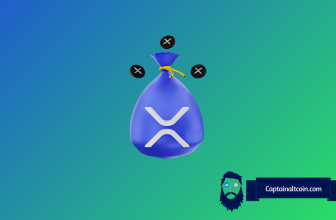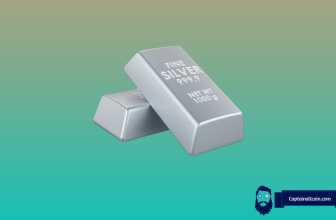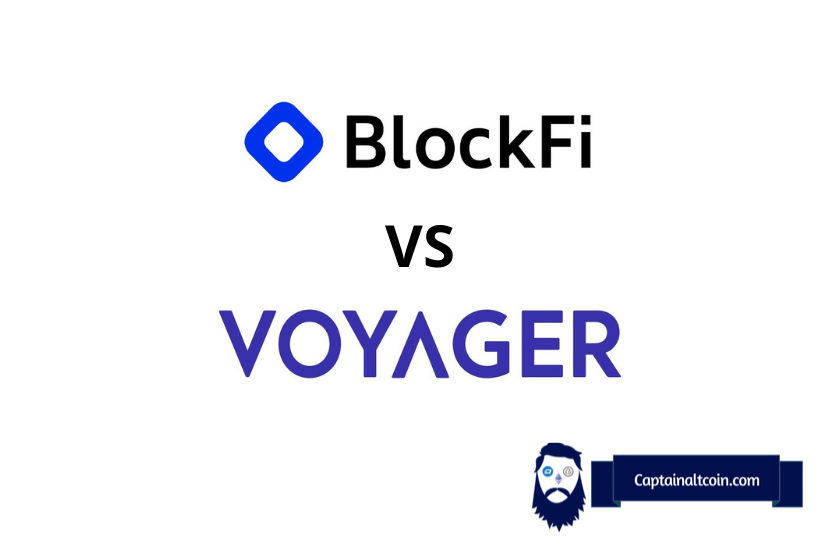
Today we’ll be comparing two huge crypto service companies, Voyager and BlockFi.
First off, Voyager Invest is a crypto interest account and broker that offers commission-free trading and its crypto interest among other things. The platform excels in its accessibility and it’s simple enough to be used even by rookie investors.
BlockFi on the other hand is another US based CeFi company offering high-yield interest accounts for your BTC, ETH and USDC. And just Nexo it also works as a crypto-lender. It’s become a staple in the cryptoverse providing clients with an exchange, interest account, and credit card that are all interconnected.
What you'll learn 👉
BlockFi vs. Voyager: Key Information
| BlockFi | Voyager Invest | |
| Site Type | Cryptocurrency interest account + basic exchange | Crypto exchange + crypto interest account |
| Beginner Friendly | Yes | Yes |
| Mobile App | Yes | Yes |
| Buy/Deposit Methods | ACH, wire transfers,crypto deposits | Debit card, credit card, bank wire, external crypto transfer |
| Sell/Withdrawal Methods | External crypto wallet, bank account | External crypto wallet transfer |
| Available Cryptocurrencies | Bitcoin, Ethereum, Litecoin, Link + stablecoins | Bitcoin, Ethereum, Litecoin, and around 60 others |
| Company Launch | 2017 | 2017 |
| Location | Jersey City, NJ, USA | Jersey City, New Jersey, United States |
| Community Trust | Great | Great |
| Security | Great | Unclear |
| Customer Support | Good | Okay |
| Verification Required (KYC) | Yes | Yes |
| Fees | Medium | Okay (uses a hidden spread instead of flat fees) |
Main Features
BlockFi is best described as Crypto Lending Platform, its three main offering are:
- High-yield crypto savings accounts
All you have to do is deposit your funds to BlockFi and you’ll earn monthly compounded interest from them. Just like with a bank account, but fortunately with a lot higher yearly returns.
- Crypto collateral for loans
On BlockFi your crypto can be used as collateral for loans, without needing to sell any.
- Cryptocurrency Trading
BlockFi also offers an exchange on which you can trade BTC, LTC, ETH, USDC & GUSD
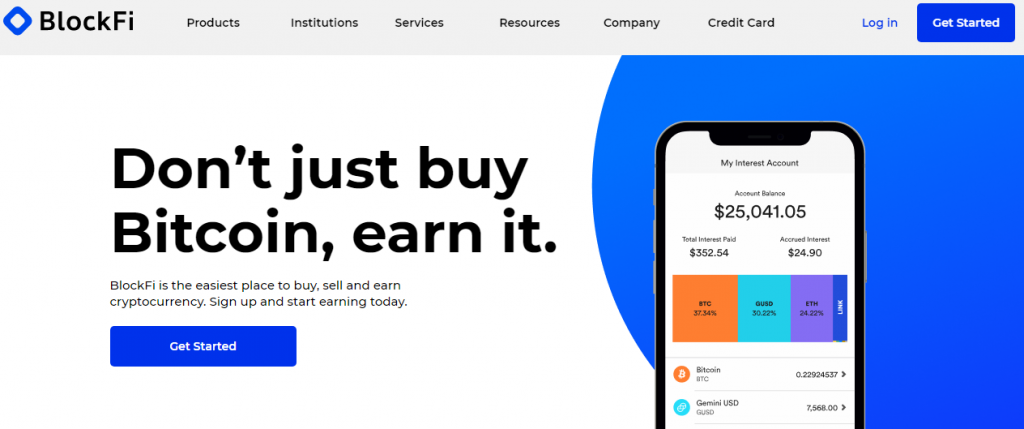
While Voyager:
- Voyager allows the purchase of cryptocurrencies from a wide array of exchanges,.
- Up to 10% APY on over 50 cryptocurrencies, such as BTC, ETH, USDC, LTC, DAI, DODGE, and BCH.
- The platform is commission-free
Interest Rates: Who’ll earn you more, BlockFi or Voyager?
First of, BlockFi excels in its simplicity. This is a huge pro as users simply deposit their funds to calculate their saving yields. Additionally your holdings are not time bound, you can retrieve them at any time.
Bitcoin
BlockFi uses a tiered interest-rate system for Bitcoin. In other words, returns depend on how much Bitcoin you hold. Although they slightly fluctuate, rates are around:
- 4% for 0 – 0.25 BTC
- 1.5% for 0.25 – 5 BTC
- 0.25% for more than 5 BTC.
On Voyager you’ll earn 5.75% APY on your BTC, but you have to maintain a minimum balance of 0.01 BTC to qualify to earn any interest.
Ethereum
BlockFi uses a tiered interest-rate system also for Ethereum. Current rates are:
- 4% for 0 to 5 ETH
- 1.5% for 5 to 50 ETH
- 0.25% for over 50 ETH.
Voyager gives investors 4.6% APY on ETH for a minimum of 0.5 ETH balance.
| Coin Name | BlockFi | Voyager |
| Aave | N/A | 3.00% |
| Chainlink | 3% (0 – 750 LINK), 0.5% (>750 LINK) | 4.50% |
| Bitcoin Cash | N/A | 2.00% |
| Compound | N/A | 4.00% |
| Dash | N/A | 3.00% |
| Cosmos | N/A | 3.00% |
| UNI | 3.75% (0 – 750 UNI), 1.5% (> 750 UNI) | 2.00% |
| Dogecoin | N/A | 2.00% |
| Litecoin | 4.5% (0 – 100 LTC), 2% ( >100 LTC) | 5.50% |
| Polkadot | N/A | 12.00% |
Stablecoins
| Coin | BlockFi | Voyager |
| Tether | 7.5% (0 – 50,000), 5% (> 50,000) | N/A |
| GUSD | 7.5% (0 – 50,000), 5% (> 50,000) | N/A |
| USDC | 7.5% (0 – 50,000), 5% (> 50,000) | N/A |
This round is close but Voyager comes out on top providing higher yields for staple coins like Bitcoin and Ethereum. Although not true in all examples they also provide a higher APY for altcoins such as Aave and Compound.
However BlockFI does offer a lot more choice. For example, Voyager does not give investors the opportunity to gain on stablecoins. So it really boils down to personal choice.
Payouts and Withdrawals
The interest users earn on BlockFi is earned daily and paid out once a month. This is slightly different then other competitors that payout the interest earned on a daily basis. These funds can then be withdrawn in stablecoins once a month. But if you go past this trehold you will incur a charge.
Your assets in BlockFi will begin accruing interest the day after you make your deposit. Interest is compounded monthly.
Similarly also Voyager pays out interest to investors monthly and even offers free withdrawals. However there’s a catch, users have to first convert their crypto to USD, which unfortunately is a taxable event.
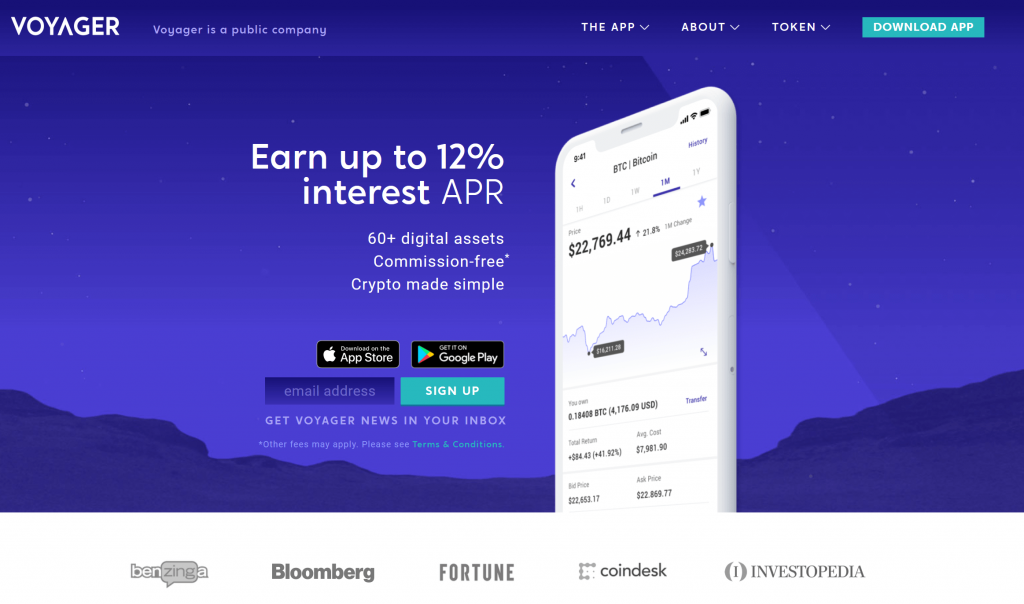
The winner here is BlockFi as it allows withdrawals directly in crypto a tax free event in most countries.
Security
Both platforms take security as a priority. Neither has even suffered a breach or any other major security issues.
BlockFi holds almost all users’ funds 95% in cold storage. These are managed by Gemini which holds a SOC certification, the risk of any external breaches is low to none.
Voyager is a similar story. Both companies have no additional security on the funds and only offer a government backed $250k on USD and not crypto.
Although Voyager also works with a 2-factor identification process there’s not much else they’ve disclosed about their security protocol. So in that light this round should go BlockFi as more clarity is provided.
Feature #4: Ease of Use
Both platforms excel in their simplicity. Allowing debit, credit and bank transfers making it very accessible to beginners. They also offer their service on a mobile app so you access them wherever you are.
But it’s worth mentioning that BlockFI has a web app while Voyager does not.
Supported Coins
Voyager
Voyager currently supports the following crypto:
- Cardano (ADA)
- Algorand (ALGO)
- Cosmos (ATOM)
- Avalanche (AVAX)
- Band Protocol (BAND)
- Basic Attention Token (BAT)
- Bitcoin Cash (BCH)
- Bitcoin Satoshi’s Vision (BSV)
- Bitcoin (BTC)
- BitTorrent (BTT)
- Celo (CELO)
- Compound (COMP)
- Dai (DAI)
- Dash (DASH)
- DigiByte (DGB)
- Dogecoin (DOGE)
- Polkadot (DOT)
- Enjin (ENJ)
BlockFi
BlockFi supports Bitcoin, Ethereum, Litecoin, and PAXG, and stablecoins such as USDC, USDT, GUSD, and PAX.
The Pros
Voyager
Some of the best Voyager features are:
Ease of trading ✔️
The Voyager app is designed to be easy to use, accessible and straightforward. It looks especially designed for beginners, as placing an order can be done in just a few seconds. A couple taps and you just have to wait for the order to complete.
Free crypto education ✔️
Voyager is tailored to all traders, in particular beginners. That’s why it also offers free crypto education, so that traders know what they’re getting into. The best example of their commitment to education is Node, their blog as well as their newsfeed.
Easy signup ✔️
Continuing their insistence of accessibility, even opening an account with Voyager is laughably easy. All you need to start trading is a couple minutes. Insert your personal details through the app and you’re good to go.
Interest Account ✔️
Like we already discussed in detail Voyager also provides users the opportunity to earn interest with their crypto holdings.
The Voyager Token ✔️
Voyager also comes with their own native Voyager Token. It allows traders to use their Smart Order Routing technology and make the most of every trade by taking advantage of the discrepancies between different exchanges. The technology automatically connects with dozens of other exchanges and allows you to pick the best.
What this essentially means is that you can compare different spreads and liquidity among crypto exchanges.
BlockFi
Compounding Interest ✔️
With BlockFi users can earn a yield with their crypto, and grow their holding by compounding interest each month. This means that as time goes by you’ll earn more and more on your holdings as they will be growing.
Use Crypto as Collateral ✔️
Borrow against your portfolio
With BlockFi traders can borrow USD and use crypto as a collateral, with interest rates as low as 4.5%. The biggest advantage of this is that you won’t have to pay capital gains tax, if instead of selling you borrow.
The BlockFi Credit Card
The BlockFi Credit card works much in the same way. The cash back is actually “Bitcoin back” as users will receive it at every purchase. The reward structure may be a little more complicated to grasp so we’ll break it down for you.
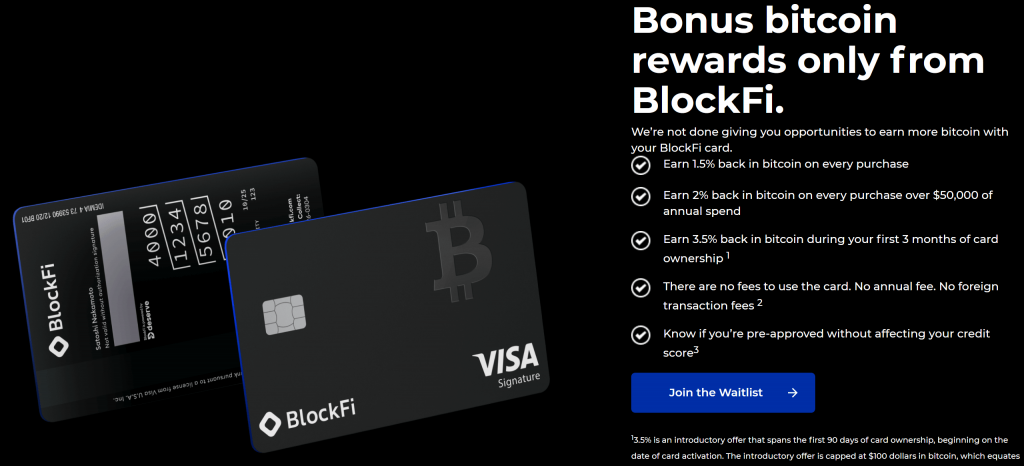
- Intro Bonus: A 3.5% Bitcoin rewards for the first 90 days on all your purchase and upto $100 in Bitcoin. But keep in mind that to reach that $100 threshold you’ll have to spend more than $5000, so that’s covered.
- Trading bonus: 0.25% back in Bitcoin on your trades, to a maximum of $500 in per month.
- Spend bonus: You’ll receive 2% back in Bitcoin on purchase over $50,000 of annual spend. Rewards rate below that will be 1.5% and resets on the card anniversary date every year.
Both cards are great options. The NEXO may have a higher yield but it doesn’t offer a trading bonus. So it’s up to the preference of each user to decide.
The Cons
Voyager
No Web App ❌
Unfortunately Voyager only offers a mobile app which is bummer for those who’d rather trade on their computer. Trading if professional cannot be done on a small sized screen like a mobile phone, Voyager clearly cuts a substantial part of the market out by not offering this functionality.
Limited Customer Service Channels ❌
When it comes to money, there’s no joking around. Unfortunately with Voyager if there’s an issue with your money, you’ll have to jump through hoops to talk to someone that might help. As the company only offers customer service through their live chat and email, a hot line would work a lot better.
BlockFi
Limited Free Withdrawals ❌
Even though it’s great stuff that BlockFi is offering free withdrawals, it’s a shame that it’s limited to only one a month.
High Trading Spread ❌
BlockFi is not a platform designed specifically for trading, that’s why it’s lacking in that department. Traders who choose BlockFi will find themselves seeing their profits being eaten up by the high bid-ask spread.
BlockFi vs Voyager: Fees
No investor likes getting milked dry, so let’s take a look at the fees.
Voyager has one of the lowest fees on the market. They’re so low, it’s almost negligible, trading for instance is fee free. Although there’s a catch, the withdrawal fees are higher than you would expect, falling between $5 to $10 per withdrawal.
Comparatively, BlockFi’s trading fees are way higher, as this is not their focus. Although their fee-free withdrawals are worthy of mention.
Read also how Blockfi fares in comparison with Nexo and YouHodler. And finally, check this article for a full list of the best Blockfi alternatives.
- Blockfi vs Celsius Network: Safety, Interest Rates, Supported Coins
- Crypto.com vs BlockFi
- YouHodler Review
- CEX.IO Loans Review
- Binance Earn Review
The Verdict
Choosing a winner between BlockFi and Voyager is easier said than done, as both companies appeal to different users. Voyager is tailored towards the mobile trading crowd, the zoomer buying crypto on his phone. While BlockFi may be better for a more professional crowd.
Although Voyager does have higher yields and a native token with strong use case, it does not offer a crypto credit card or crypto collateralized loans. The customer service is also quite lacking on Voyager which is not ideal for people with a lot of capital on their app, as they need reassurance if it comes to a failure.
So it’s all up to you. What platform appeals to you, BlockFi or Voyager?



